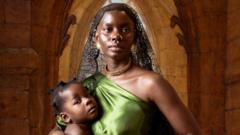*Dola Posh reflects on her battle with postnatal depression, embracing her identities and using photography to heal and inspire others.*
**Rediscovering Identity: A Photographer's Journey Through Postnatal Depression**

**Rediscovering Identity: A Photographer's Journey Through Postnatal Depression**
*Dola Posh uses her lens to illuminate the struggles of motherhood and mental health.*
In the midst of a pandemic, Dola Posh confronted a battle far deeper than the health crisis surrounding her. Just six days postpartum, as she lay alone in a hospital bed in England, she became acutely aware of her shifting identity. Dola, whose multifaceted identity includes being a Nigerian, Briton, mother, and photographer, was haunted by doubts and darkness after giving birth to her daughter. She felt an overwhelming disconnect from her former self, pondering if the woman who loved photography still existed within her.
During her confinement, faced with a deluge of parental advice from afar, and separated by thousands of miles from her family in Lagos, Nigeria, the new mother struggled. "I’m me; the baby’s out, I’m still me," she thought, oblivious to the fact that she was grappling with postnatal depression, a condition that disproportionately impacts black women like herself.
The isolation intensified, pushing Dola to a breaking point. One sleepless night, the darkness within her amplified, and an alarming voice suggested ending it all. However, the lifeline arrived when she mustered the courage to reach out to her health visitor. Embarrassed but desperate, she began to seek help, including therapy that urged her to use her photography as a conduit for her emotions.
Reclaiming her passion, Dola turned the lens inward. She created self-portraits alongside her daughter, Monioluwa, using this artistic expression to navigate her feelings surrounding depression. Drawing on motifs of motherhood inherent in iconic art, Dola’s photography began to reflect her intricate journey, even as unconscious connections to her past manifested through her family’s cultural religious background.
Rekindling her familial ties through her art, Dola emphasized the ritual of wearing her veil, transforming what once felt like a marker of emptiness into a symbol of strength and connection. “It didn’t feel like that empty person any more,” she expressed, feeling anchored in her identity.
As her journey unfolded, Dola made the courageous decision to share her story publicly, confronting the stigma associated with postnatal depression. Her storytelling roots lie in the hope for a world where black mothers don’t carry undue burdens alone, leveraging her experience to facilitate open dialogue about mental health.
Winning an award from camera manufacturer Leica provided Dola with the resources to expand her project, ultimately championing awareness and reflection for others navigating similar journeys. With a determined voice, she declared: “I almost ended my life, I’m not ashamed of it – I am still an artist, I am still a woman.”
This powerful narrative not only emphasizes the importance of mental health conversations and representation but also serves as a reminder that many mothers are silently battling their demons. Dola Posh's story signifies a pivotal shift, one where vulnerability can lead to healing, connection, and community.
During her confinement, faced with a deluge of parental advice from afar, and separated by thousands of miles from her family in Lagos, Nigeria, the new mother struggled. "I’m me; the baby’s out, I’m still me," she thought, oblivious to the fact that she was grappling with postnatal depression, a condition that disproportionately impacts black women like herself.
The isolation intensified, pushing Dola to a breaking point. One sleepless night, the darkness within her amplified, and an alarming voice suggested ending it all. However, the lifeline arrived when she mustered the courage to reach out to her health visitor. Embarrassed but desperate, she began to seek help, including therapy that urged her to use her photography as a conduit for her emotions.
Reclaiming her passion, Dola turned the lens inward. She created self-portraits alongside her daughter, Monioluwa, using this artistic expression to navigate her feelings surrounding depression. Drawing on motifs of motherhood inherent in iconic art, Dola’s photography began to reflect her intricate journey, even as unconscious connections to her past manifested through her family’s cultural religious background.
Rekindling her familial ties through her art, Dola emphasized the ritual of wearing her veil, transforming what once felt like a marker of emptiness into a symbol of strength and connection. “It didn’t feel like that empty person any more,” she expressed, feeling anchored in her identity.
As her journey unfolded, Dola made the courageous decision to share her story publicly, confronting the stigma associated with postnatal depression. Her storytelling roots lie in the hope for a world where black mothers don’t carry undue burdens alone, leveraging her experience to facilitate open dialogue about mental health.
Winning an award from camera manufacturer Leica provided Dola with the resources to expand her project, ultimately championing awareness and reflection for others navigating similar journeys. With a determined voice, she declared: “I almost ended my life, I’m not ashamed of it – I am still an artist, I am still a woman.”
This powerful narrative not only emphasizes the importance of mental health conversations and representation but also serves as a reminder that many mothers are silently battling their demons. Dola Posh's story signifies a pivotal shift, one where vulnerability can lead to healing, connection, and community.





















